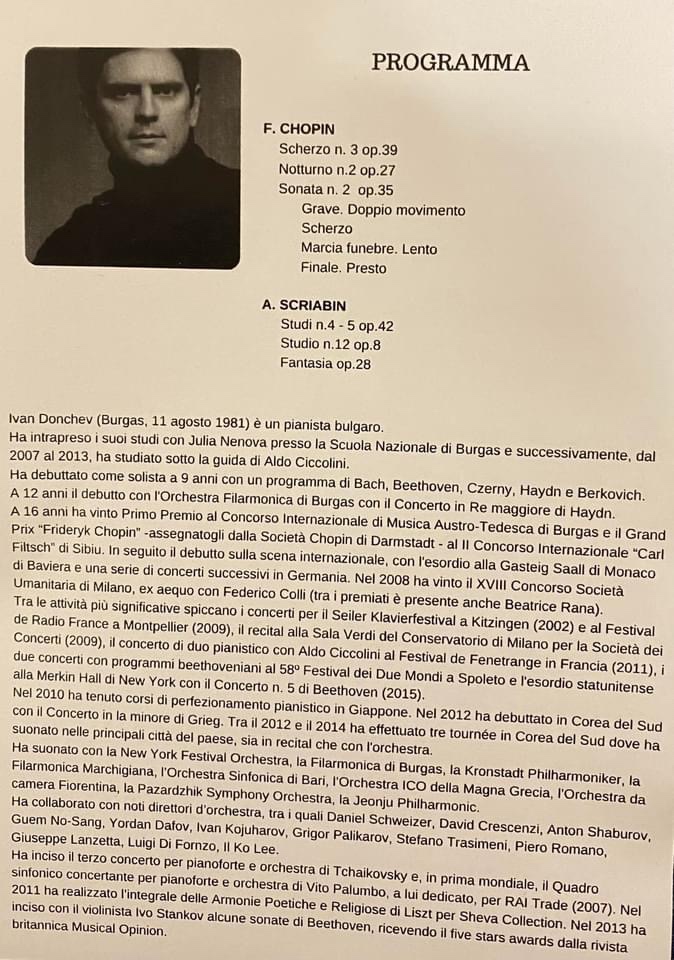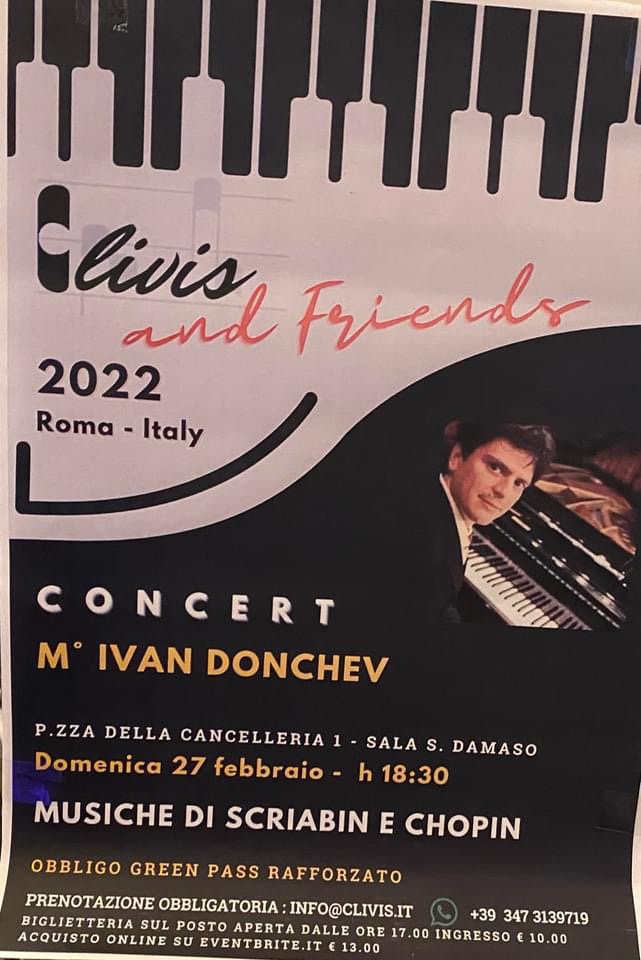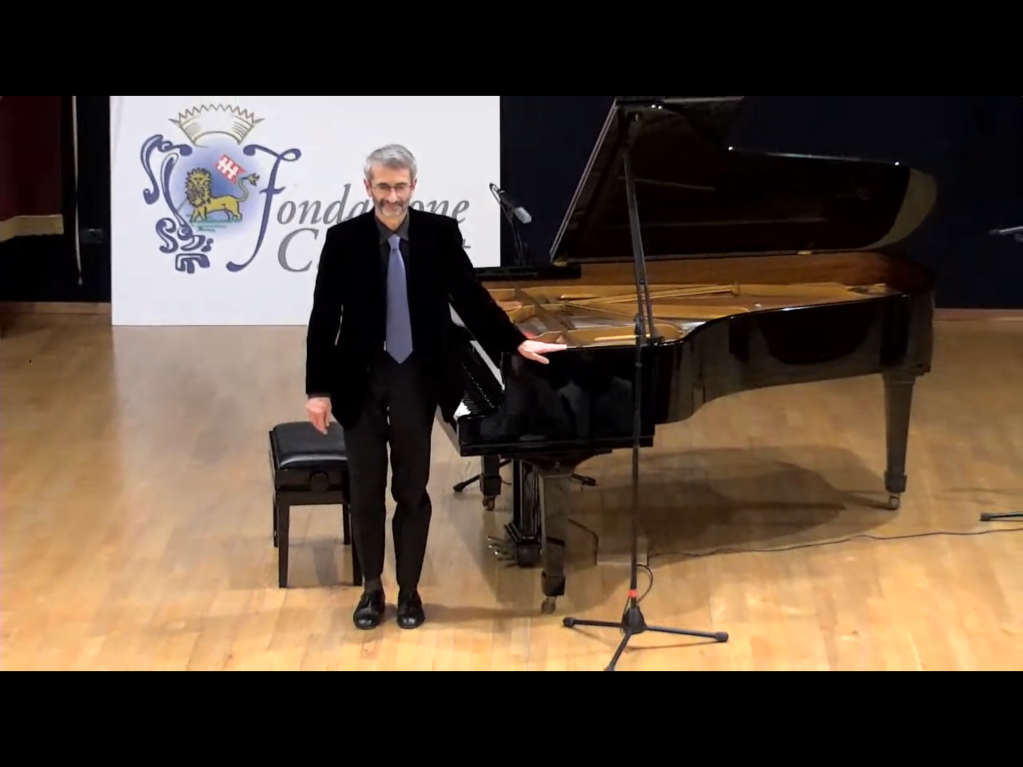
A recital by Ivan Donchev tonight in the Cancelleria in Rome.
Chopin and Scriabin showed his stylish elegance and strong personality that carved a clear line of ravishing sounds as he braved the high wire between tradition and scholarship just as his mentor Aldo Ciccolini had shown us for so many years.

Nowhere was it more evident than in the Chopin minute waltz thrown off with such elegant ease even the slight hesitation at the end of the first phrase was worthy of Ciccolini or even Rubinstein in its twin op 64 n 2.
Ivan allowed himself such freedom at the end that Ciccolini would have approved of but Rubinstein might have lifted an eye brow as it tended more to the old tradition of De Pachmann than the scrupulous adherence to the score.

The nocturne in D flat op 27 was played with such beauty and aristocratic control that one could forgive his rather slow tempo.Such was his sense of balance that there was a radiance to the melodic line that was played with disarming simplicity with great sentiment but never sentimental.It was a vision of beauty rather than Chopin’s miniature tone poem that is every bit as expressive as the Ballades but in a much shorter space.
In the nocturnes Chopin manages to say so much in such a short span as he does in the mazurkas.I did not entirely share his view of this nocturne but the magic spell he cast was of a great artist convinced as he was convincing.

Opening with the third scherzo Ivan immediately demonstrated his supremity as a stylist.A performance of such power and ravishing beauty but also an awareness of the overall architectural shape that I have rarely heard in the concert hall.The great chorale melody was illuminated by the streams of golden sounds that descended from on high where so often in lesser hands the delicate filigree accompaniment interrupt rather than illuminate the overall musical line.An overpoweringly convincing performance.There was room for freedom and playing of such poignancy too but never disturbing the overall architectural line of such aristocratic nobility.

I was not so convinced by the first movement of the B flat minor sonata that I found rather too dramatic and tempestuous.Surely the doppio movimento is the same whispered wind that pervades the extraordinary last movement as it pervades the whole of this masterpiece.His much less dramatic return to the opening flourish seemed more in tune with the atmosphere than his rather overstated majestic beginning.It is hinted at in the lightness of the scherzo too that I found rather too serious in Ivan’s hands.Of course the lyrical second subject of the first movement or the central episode of the scherzo was played with great beauty and a freedom of aristocratic good taste.There were some rather strange counterpoints in the Funeral March and even more so at the end of the last movement but played with such conviction that made it easily acceptable as Ivan’s personal musicianly vision.The trio of the Funeral March was played with unusually robust
tone that I found very convincing in the way it created a whole rather than fragmented picture of this desolate scene.The hands ‘conversing together’ in the last movement as they create a perpetuum mobile of sounds that in Chopin’s time must have seemed quite revolutionary.Ivan tried to find some melodic line too but was a little too explicit for a movement of whispered suggested sounds of quite extraordinary genius.

Of course Scriabin found the ideal interpreter in Ivan.Ravishing sounds and a kaleidoscopic sense of colour allied to technical prowess and passionate involvement .
Three studies played with sumptuous sounds and astonishing technical command.The extraordinary difficulties just disappeared as we were led through this world of wondrous sounds where the musical line was always so clear amidst the enormous technical difficulties that we were never openly made aware of.
Scriabin’s Fantasie was played with demonic streams of golden sounds as we reached the sumptuous ecstasy of the ‘star’ shining with such passion and beauty in Ivan’s masterly hands.

The beauty and stillness of the Prelude in B minor by Bach- Siloti was a moving tribute that Ivan wanted to share with us in this particularly disturbing moment that we are sharing with a world frustrated by its impotence in the face of such prepotence!























































































